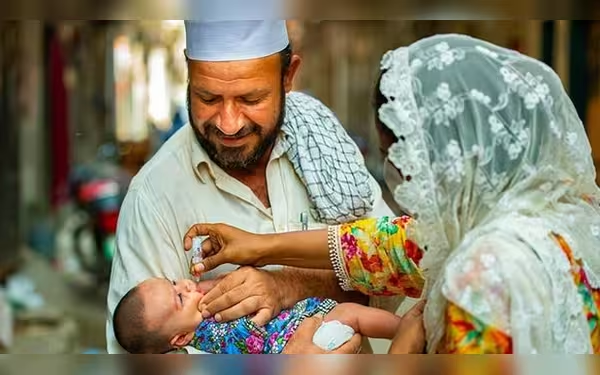Thursday, November 7, 2024 08:33 PM
Sindh Confirms Two New Polio Cases, Nationwide Tally Reaches 39
- Two new polio cases reported in Sindh.
- Nationwide polio cases surge to 39 in 2024.
- Government to launch anti-polio campaign on October 28.
 Image Credits: geo
Image Credits: geoSindh reports two new polio cases, raising the national total to 39. A nationwide vaccination campaign is set to begin on October 28.
In recent years, Pakistan has faced a significant challenge in its fight against polio, a highly infectious viral disease that primarily affects children. The country has been striving to eradicate this disease, which can lead to paralysis and even death. Unfortunately, the situation has taken a concerning turn as two new cases of wild poliovirus type-1 (WPV1) have been confirmed in Sindh, bringing the total number of cases nationwide to 39 in 2024.
The National Emergency Operations Centre (EOC) reported that the latest victims are a young boy from Mirpurkhas and a girl from Sanghar. These cases mark the first instances of polio in their respective areas this year, highlighting the ongoing risk of the virus in regions that have previously been affected. The rise in cases is alarming, especially as environmental samples from Mirpurkhas had already tested positive for WPV1 earlier this year, indicating a troubling increase in virus transmission.
As of now, Sindh has reported 12 cases, following Balochistan, which has recorded the highest number at 20. Khyber Pakhtunkhwa has seen five cases, while Punjab and Islamabad have reported one case each. Tragically, at least three children have succumbed to the disease this year, with victims from Karachi and Balochistan. One of the deceased, a child named Abdullah, was from Karachi’s Bin Qasim Town, while the other two were from Killa Saifullah and Quetta in Balochistan.
In response to this alarming situation, the government is preparing to launch a nationwide anti-polio vaccination campaign starting October 28. However, the campaign faces significant hurdles due to widespread misinformation and conspiracy theories that have led to vaccine hesitancy among parents. Many individuals, particularly in regions like Balochistan and Khyber Pakhtunkhwa, refuse to vaccinate their children due to unfounded fears, such as the false belief that vaccines cause infertility or are part of a foreign conspiracy.
The Polio Eradication Initiative (PEI) officials are urging parents to rely on scientific facts and consult healthcare professionals regarding the safety and importance of vaccines. They emphasize that “vaccines are safe and essential to protect children from paralysis.” Ignoring these facts and listening to conspiracy theories can put children at grave risk, and it is crucial for communities to come together to combat this misinformation.
As Pakistan continues its battle against polio, it is vital for parents and communities to understand the importance of vaccination. Protecting children from this preventable disease is not just a personal responsibility but a collective one. By ensuring that every child receives the polio vaccine, we can work towards a future where polio is no longer a threat to our children’s health. The fight against polio is far from over, and it requires the commitment and cooperation of every individual to safeguard the health of future generations.













